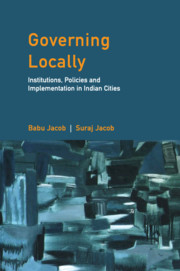5 - State–Local Relations
Published online by Cambridge University Press: 06 August 2021
Summary
For decades, India's constitutional framework had two government levels, national and state. The 74th constitutional amendment (CA) added a third, local government, by devolving some functions of the state government. This implied a change in state–local relations. The reforms recognised that past efforts at decentralisation were ineffective due to inadequate devolution, irregular elections and prolonged supersession – all controlled by state governments loathe to give up authority and power. To recalibrate state–local relations, the CA laid out the manner of holding local elections and raising resources for city governments and also listed the functions to be devolved. But in India local governance falls under the authority of state legislatures. Much is involved in translating the intent of the national CA to the actual resetting of state–local relations. And in fact, by the time the intent was translated – through state laws, rule-making and policy implementation – there was considerable drift and distortion in many states.
Following the CA, each state legislature was expected to pass accompanying legislation for decentralisation. The new state law would carve out the field of action for local governments to exercise their new policy functions. Decentralisation law could vary considerably across states in principle, and this in fact occurred. Among all states, Kerala's law has the most elaborate list of municipal functions (27 groups of items), leading to scholar-bureaucrat K. C. Sivaramakrishnan's optimism about robust decentralisation and accountability. And yet such expanded lists hide more than they reveal.
For implementing the provisions of a law, the legislature specifies which details should be worked out and by whom. This is done through ‘rule-making’, that is, constructing the ‘rules of the (decentralisation) game’ by elaborating upon the laws through rules. The details of ceding of authority from state to local government lie in the rules. The legislature usually authorises the executive or a specific agency of the executive to frame rules. The content of the rules is greatly affected by the identity and outlook of the entity making the rules. In the case of Kerala and Tamil Nadu, rule-making authority was given to the state government whereas in Gujarat it was given to local governments. When the state government makes rules, its contents are usually developed by the state bureaucracy under a minister. When the local government makes rules, its contents are decided by the council, a body of elected representatives.
- Type
- Chapter
- Information
- Governing LocallyInstitutions, Policies and Implementation in Indian Cities, pp. 141 - 167Publisher: Cambridge University PressPrint publication year: 2021



